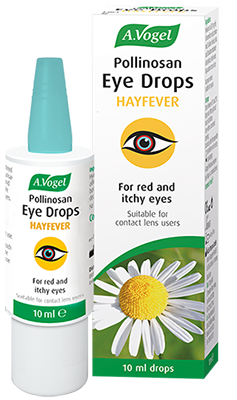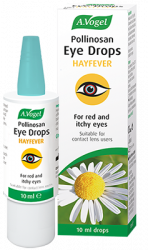An introduction to hayfever treatments
Many people look for some form of relief from the irritating symptoms of hayfever. Remedies range from anti-histamines to complementary remedies. However, as everyone reacts to pollen in slightly different ways, you may need to try a few treatments before finding the one which is most effective for you.
Antihistamines
Hayfever symptoms arise because of an excessive production of histamine by the immune system, in response to an allergen (allergy causing agent) such as pollen.
This is the basis for the use of antihistamine tablets, liquids or sprays as the main conventional method for treating hayfever. Antihistamines stop the release of histamines by the immune system. They are readily available in pharmacies and supermarkets, and can relieve symptoms such as itching or watery eyes and nose.
However, many antihistamines have the disadvantage of causing drowsiness - and if you are so affected, you should not drive or operate machinery. In addition, antihistamines are not able to help you if you suffer from a blocked nose.
Eye drops
Whilst antihistamines taken orally can be helpful for many symptoms, sometimes specific treatment for the eyes may be necessary. This is especially so if your hayfever symptoms are mainly itching or swelling of the eyes.
Eye drops for hayfever can come in two forms:
- Drops containing the chemical sodium cromoglycate. This works by desensitising a specific type of cell in the immune system, reducing its ability to react to pollen
- Eye drops containing hyaluronic acid. These help to wash away pollen by working with the natural tear secretion in the eyes.
In general, eye drops can be used together with any medicine taken orally for hayfever.
Non-drowsy herbal remedy
If your eyes or nose are itchy, puffy, runny of blocked, if you can’t stop sneezing (especially first thing in the morning) or you can’t see properly due to irritated, watery eyes, Pollinosan Hayfever tablets are a natural combination of herbs, including luffa which are no-drowsy and work quickly to relieve the symptoms of hayfever.
![]() "Recommend this remedy to anyone who suffers with hayfever or allergies"
"Recommend this remedy to anyone who suffers with hayfever or allergies"![]()
Steroids
Steroids work by dampening or lowering the body’s immune response. This is why, if you are prone to infections, you should not use this class of medicines.
Hayfever steroid treatments are available in a number of forms:
- Steroid nasal sprays. These can be useful if your hayfever gives you a blocked nose
- Steroid tablets. These are prescribed by doctors if hayfever symptoms are severe. In these situations, in addition to the usual hayfever symptoms, you may be complaining of tiredness, fatigue or itching throughout the body.
Other nasal sprays
For those people who prefer to avoid the use of steroids, ‘Non-steroidal’ nasal sprays are available and are especially useful for blocked noses caused by hayfever.
They work partly by ‘irrigating’ or ‘washing out’ the nasal passages and in this way, free up blocked nasal passages. Hayfever nasal sprays also have the advantage of getting rid of any pollen lying on the surfaces of the lining of the nose.
Complementary medicine
A wide range of treatments is available under this umbrella, ranging from herbal medicines to acupuncture and beyond. Complementary treatments which can help relieve hayfever symptoms include:
- Acupuncture – this form of treatment originated from China and is now widely available for treating a variety of health conditions, including hayfever
- Herbal or homeopathic remedies – Many homeopathic remedies are derived from herbs and these have been used traditionally to treat a number of health conditions including the relief of hayfever.





 Looking for relief of red and itchy eyes due to hayfever?
Looking for relief of red and itchy eyes due to hayfever?

